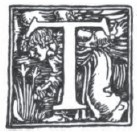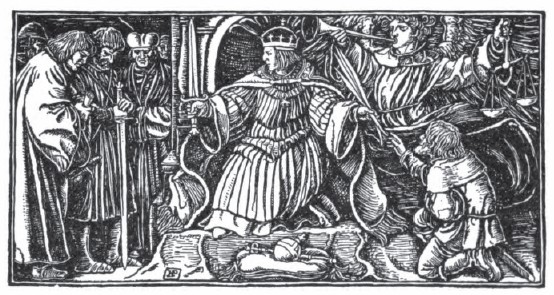 XIV. How Otto Saw the Great Emperor. 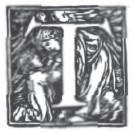 HROUGH
weakness and sickness and faintness, Otto had lain in a half swoon
through all that long journey under the hot May sun. HROUGH
weakness and sickness and faintness, Otto had lain in a half swoon
through all that long journey under the hot May sun.
It was as in a dreadful nightmare that he had heard on and on and on that monotonous throbbing of galloping hoofs upon the ground; had felt that last kiss that his father had given him upon his cheek. Then the onward ride again, until all faded away into a dull mist and he knew no more. When next he woke it was with the pungent smell of burned vinegar in his nostrils and with the feeling of a cool napkin bathing his brow. He opened his eyes and then closed them again, thinking he must have been in a dream, for he lay in his old room at the peaceful monastery of the White Cross on the hill; the good Father Abbot sat near by, gazing upon his face with the old absent student look, Brother John sat in the deep window seat also gazing at him, and Brother Theodore, the leech of the monastery, sat beside him bathing his head. Beside these old familiar faces were the faces of those who had been with him in that long flight; the One-eyed Hans, old Master Nicholas his kinsman, and the others. So he closed his eyes, thinking that maybe it was all a dream. But the sharp throbbing of the poor stump at his wrist soon taught him that he was still awake. "Am I then really home in St. Michaelsburg again? he murmured, without unclosing his eyes. Brother Theodore began snuffling through his nose; there was a pause. "Yes," said the old Abbot at last, and his gentle voice trembled as he spoke; "yes, my dear little child, thou art back again in thine own home; thou hast not been long out in the great world, but truly thou hast had a sharp and bitter trial of it." "But they will not take me away again, will they?" said Otto quickly, unclosing his blue eyes. "Nay," said the Abbot, gently; "not until thou art healed in body and art ready and willing to go." Three months and more had passed, and Otto was well again; and now, escorted by One-eyed Hans and those faithful few who had clung to the Baron Conrad through his last few bitter days, he was riding into the quaint old town of Nurnburg; for the Emperor Rudolph was there at that time, waiting for King Ottocar of Bohemia to come thither and answer the imperial summons before the Council, and Otto was travelling to the court. As they rode in through the gates of the town, Otto looked up at the high-peaked houses with their overhanging gables, the like of which he had never seen before, and he stared with his round blue eyes at seeing them so crowded together along the length of the street. But most of all he wondered at the number of people that passed hither and thither, jostling each other in their hurry, and at the tradesmen's booths opening upon the street with the wonderful wares hanging within; armor at the smiths, glittering ornaments at the goldsmiths, and rich fabrics of silks and satins at the mercers. He had never seen anything so rich and grand in all of his life, for little Otto had never been in a town before. "Oh! look," he cried, "at that wonderful lady; see, holy father! sure the Emperor's wife can be no finer than that lady." The Abbot smiled. "Nay, Otto," said he, "that is but a burgher's wife or daughter; the ladies at the Emperor's court are far grander than such as she." "So!" said Otto, and then fell silent with wonder. And now, at last the great moment had come when little Otto with his own eyes was to behold the mighty Emperor who ruled over all the powerful kingdoms of Germany and Austria, and Italy and Bohemia, and other kingdoms and principalities and states. His heart beat so that he could hardly speak as, for a moment, the good Abbot who held him by the hand stopped outside of the arrased doorway to whisper some last instructions into his ear. Then they entered the apartment. It was a long, stone-paved room. The floor was covered with rich rugs and the walls were hung with woven tapestry wherein were depicted knights and ladies in leafy gardens and kings and warriors at battle. A long row of high glazed windows extended along the length of the apartment, flooding it with the mellow light of the autumn day. At the further end of the room, far away, and standing by a great carved chimney place wherein smouldered the remains of a fire, stood a group of nobles in gorgeous dress of velvet and silks, and with glittering golden chains hung about their necks.
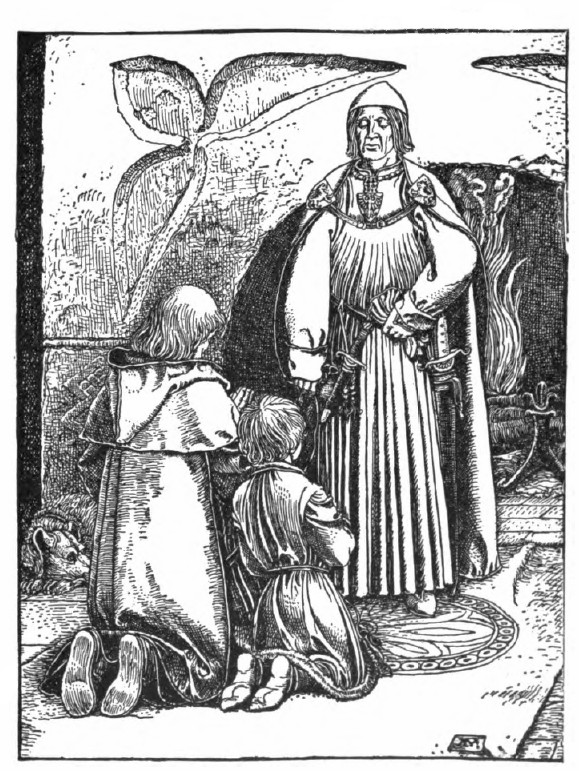 It was the great Emperor Rudolph One figure stood alone in front of the great yawning fireplace. His hands were clasped behind him, and his look bent thoughtfully upon the floor. He was dressed only in a simple gray robe without ornament or adornment, a plain leathern belt girded his waist, and from it hung a sword with a bone hilt encased in a brown leathern scabbard. A noble stag-hound lay close behind him, curled up upon the floor, basking in the grateful warmth of the fire. As the Father Abbot and Otto drew near he raised his head and looked at them. It was a plain, homely face that Otto saw, with a wrinkled forehead and a long mouth drawn down at the corners. It was the face of a good, honest burgher burdened with the cares of a prosperous trade. "Who can he be," thought Otto, "and why does the poor man stand there among all the great nobles?" But the Abbot walked straight up to him and kneeled upon the floor, and little Otto, full of wonder, did the same. It was the great Emperor Rudolph. "Who have we here?" said the Emperor, and he bent his brow upon the Abbot and the boy. "Sire," said Abbot Otto, "we have humbly besought you by petition, in the name of your late vassal, Baron Conrad of Vuelph of Drachenhausen, for justice to this his son, the Baron Otto, whom, sire, as you may see, hath been cruelly mutilated at the hands of Baron Henry of Roderburg of Trutz-Drachen. He hath moreover been despoiled of his lands, his castle burnt, and his household made prisoner." The Emperor frowned until the shaggy eyebrows nearly hid the keen gray twinkle of the eyes beneath. "Yes," said he, "I do remember me of that petition, and have given it consideration both in private and in council." He turned to the group of listening nobles. "Look," said he, "at this little child marred by the inhumanity and the cruelty of those robber villains. By heavens! I will put down their lawless rapine, if I have to give every castle from the north to the south to the flames and to the sword." Then turning to Otto again, "Poor little child," said he, "thy wrongs shall be righted, and so far as they are able, those cruel Roderburgs shall pay thee penny for penny, and grain for grain, for what thou hast lost; and until such indemnity hath been paid the family of the man who wrought this deed shall be held as surety." Little Otto looked up in the kind, rugged face above him. "Nay, Lord Emperor," said he, in his quaint, quiet way, "there are but two in the family — the mother and the daughter — and I have promised to marry the little girl when she and I are old enough; so, if you please, I would not have harm happen to her." The Emperor continued to look down at the kneeling boy, and at last he gave a short, dry laugh. "So be it," said he, "thy plan is not without its wisdom. Mayhap it is all for the best that the affair should be ended thus peacefully. The estates of the Roderburgs shall be held in trust for thee until thou art come of age; otherwise it shall be as thou hast proposed, the little maiden shall be taken into ward under our own care. And as to thee — art thou willing that I should take thee under my own charge in the room of thy father, who is dead?" "Aye," said Otto, simply, "I am willing, for it seems to me that thou art a good man." The nobles who stood near smiled at the boy's speech. As for the Emperor, he laughed outright. "I give thee thanks, my Lord Baron," said he; "there is no one in all my court who has paid me greater courtesy than that," So comes the end of our tale. But perhaps you may like to know what happened afterward, for no one cares to leave the thread of a story without tying a knot in it. Eight years had passed, and Otto grew up to manhood in the Emperor's court, and was with him through war and peace. But he himself never drew sword or struck a blow, for the right hand that hung at his side was of pure silver, and the hard, cold fingers never closed. Folks called him " Otto of the Silver Hand," but perhaps there was another reason than that for the name that had been given him, for the pure, simple wisdom that the old monks of the White Cross on the hill had taught him, clung to him through all the honors that the Emperor bestowed upon his favorite, and as he grew older his words were listened to and weighed by those who were high in Council, and even by the Emperor himself. And now for the end of all. One day Otto stood uncertainly at the doorway of a room in the imperial castle, hesitating before he entered; and yet there was nothing so very dreadful within, only one poor girl whose heart fluttered more than his. Poor little Pauline, whom he had not seen since that last day in the black cell at Trutz-Drachen. At last he pushed aside the hangings and entered the room. She was sitting upon a rude bench beside the window, looking at him out of her great, dark eyes. He stopped short and stood for a moment confused and silent; for he had no thought in his mind but of the little girl whom he had last seen, and for a moment he stood confused before the fair maiden with her great, beautiful dark eyes. She on her part beheld a tall, slender youth with curling, golden hair, one hand white and delicate, the other of pure and shining silver.
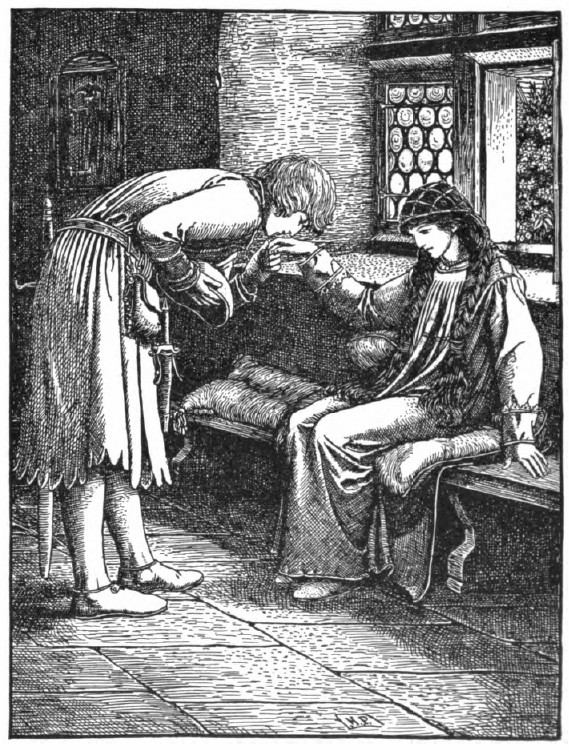 He took her hand and set it to his lips He
came to her and took her hand and set it to his lips, and all that
she could do was to gaze with her great, dark eyes upon the hero of
whom she had heard so many talk; the favorite of the Emperor; the
wise young Otto of the Silver Hand
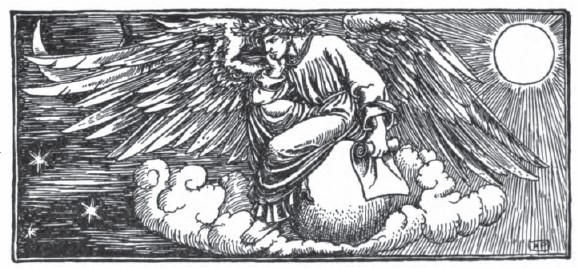
AFTERWORD.
"Manus argentea quam manus ferrea mefior est." |
Web and Book design,
Copyright, Kellscraft Studio
1999-2011
(Return to Web Text-ures)

